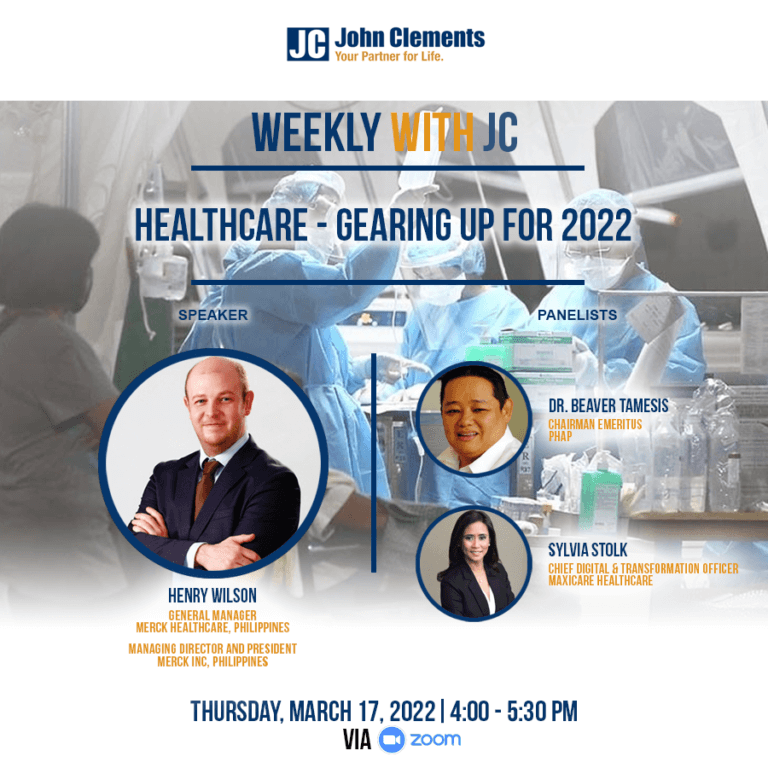The ninth Weekly with JC for 2022 featured the most current events in the healthcare industry. The session started with a poll that showed how 93% of the participants see the importance of healthcare insurance.
Mario Biscocho, John Clements’ SVP and Head of the Executive Search and Selection Division, introduced the panel of experts, who were invited to provide their insights on the industry’s current trends and directions.
The speaker for the afternoon was Mr. Henry Wilson, General Manager of Merck Healthcare Philippines; Managing Director and President of Merck Inc. Before relocating to Manila, he has had successful stints in Singapore, China, Germany, and the UK across multiple roles and divisions. He holds a Bachelor’s degree in Chemistry with Chemical Engineering from the University of Huddersfield, UK; a PhD in Chemistry from the University of Manchester, UK; and an MBA from Alliance Manchester Business School, UK.

The first reactor for the day was Dr. Beaver Tamesis, Chairman Emeritus of Pharmaceutical and Healthcare Association of the Philippines. A cardiologist, he joined MSD Philippines in 1995 as the company’s Medical Director. Later, he assumed country leadership from 2013 to 2022. Dr. Tamesis gained his medical degree from the University of the Philippines and completed his residency in Internal Medicine and fellowship in Cardiology at the Philippine General Hospital, and a research fellowship at St. Louis University in St. Louis, Missouri in the United States.
Sylvia Stolk, the second reactor for the session, has spent more than 25 years focusing on technology, finance, strategy, and operations management in the healthcare insurance management space. She graduated from Bobson College in Massachusetts, USA, with a degree in Management, Major in Finance Investments. She spent the early part of her career in the US before moving to the Philippines, providing expertise on financial analysis, greenfield operations, and generally creating value while mitigating risks.
“How do you think the market will evolve over the next five to ten years?” was the question asked by Henry to start his talk. Henry shared that in the volatile world we currently live in, predicting the future may be a challenge. He had hoped to be able to provide valuable thoughts and ideas on the topic.
A forward-looking person, Henry shared a slide showing the boardgame, “Snakes and Ladders”, to describe 2021. According to him, he first moved to the Philippines in August of 2021, during the peak of the Delta wave in the country. Eventually, toward the end of the year, cases dropped, but January came and we all shared the brunt of the Omicron surge. All of these were reflected in the cycles of the healthcare business, which became different from ever before, and not based around seasonality or buying patterns anymore. Henry compared this to a game of “Snakes and Ladders”, where most events are very unpredictable.
However, Henry said that one thing we can be incredibly proud of is that the healthcare industry has stepped up, operations and supply chain-wise. During this unprecedented event, adjusting, changing, and simply adapting to the current demands of the market became extremely pertinent. Thinking about where the industry has come from and looking at it now, after everything has been changed and readjusted, shifting operations and maximizing productivity have certainly come a long way. He said that we should all be proud of the efforts we have made, but we still have a lot more to do. “It was the best of times. It was the worst of times.”

“2022 and Beyond”, was Henry’s second slide title. As we move forward and focus on what we can expect in the future, Henry shared that he heard and, from then on, has been using the statement “The healthcare industry has undergone 10 years of changes in just one year.” He further said that we might have undergone 15 years of changes in two years. He proudly gave his congratulations to everyone involved in that, and for all the effort exerted to be able to bend and stretch and actually accommodate all the necessary adjustments.


“What comes next?” Henry jokingly encouraged the participants to do a little more reading and a little less Netflix. Thinking about strategy, Henry said that it is very pertinent for us to really analyze everything we have been doing and in choosing the battles we are going to fight. He believes that we are always lured to fall back into our old ways of working and routine. This will allow us to think more analytically and smartly and handle issues and problems more efficiently. Henry then started sharing some of his thoughts on how to gear up for 2022:

Flexibility in strategy execution will be critical. Henry wanted to capture the element of storyboarding with the slide he presented. He mentioned that this will allow us to effectively plan for strategies five to ten years from now, depending on what the world provides us with. Come up with all the things you would like to accomplish and draw a timeline or the “acts” in the storyboard. This way, you see your progress as time goes by, with the ability to be flexible.

Be (as) ready (as possible) for the black swan, which, according to Henry, is always easier said than done. He shared that black swans are almost always referred to as “Cassandras”. This comes from the Greek myth, where Cassandra was given the gift of foresight, but was not allowed to tell anyone about it. And this is sometimes how it feels with black swans, Henry said. An example he shared was the case of the Fukushima Power Plant, where an engineer warned that the area it was being built on was a tsunami danger zone—and we all know what happened there. Henry emphasized that warnings/red flags are there for a reason.

Flexibility, agility, and ambidexterity in leadership is critical. The ability to consider structure and take on conflicting views will be very important in moving forward, said Henry. Having the capability to deal with ambivalence and firmly decide how to move forward will be seen as strong leadership traits. Hybrid is here to stay and we should all be willing to accept this. It is one of those fantastic learnings that we made, which we never thought possible.

Converting data into insights and into action will be a qualifier. No longer will it be good enough to be able to produce data and data dashboards. The more important factor is the ability to turn these data/insights into action plans. Henry’s belief is that if we are not doing this in the next five years, we will not be able to stay in the game anymore.

Systems complexity and interaction will intensify. Henry believes that in the last few years, we have all become very comfortable with Power BI dashboards, Tableau dashboards, and the like. But one thing we have to recognize is that all of these systems will have to interact with each other in the long run. They have to pull data from different sources and bring these together so that we can move forward and build something from there.
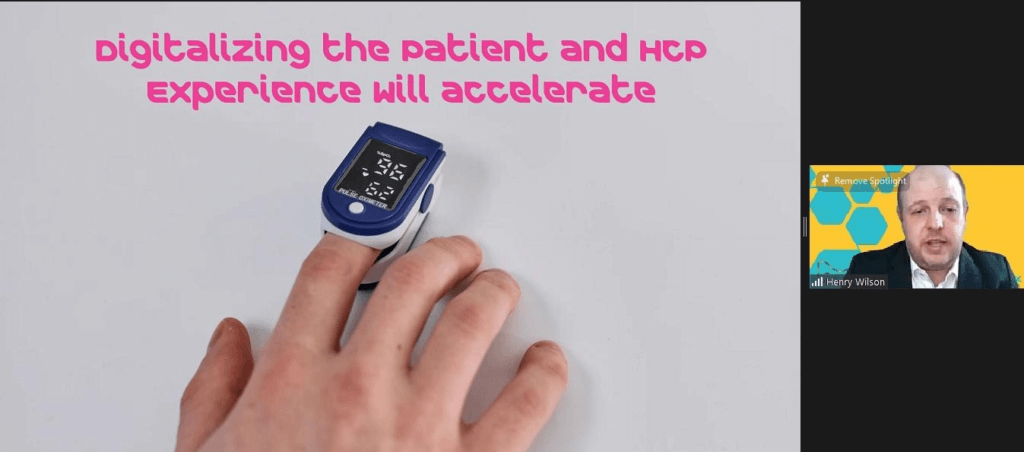
Digitalizing the patient and HCP experience will accelerate. Henry believes that different apps and platforms will play a big role in the patient-doctor interaction in the future. These digital platforms and other digital systems will have to be integrated in the future, making our lives easier.
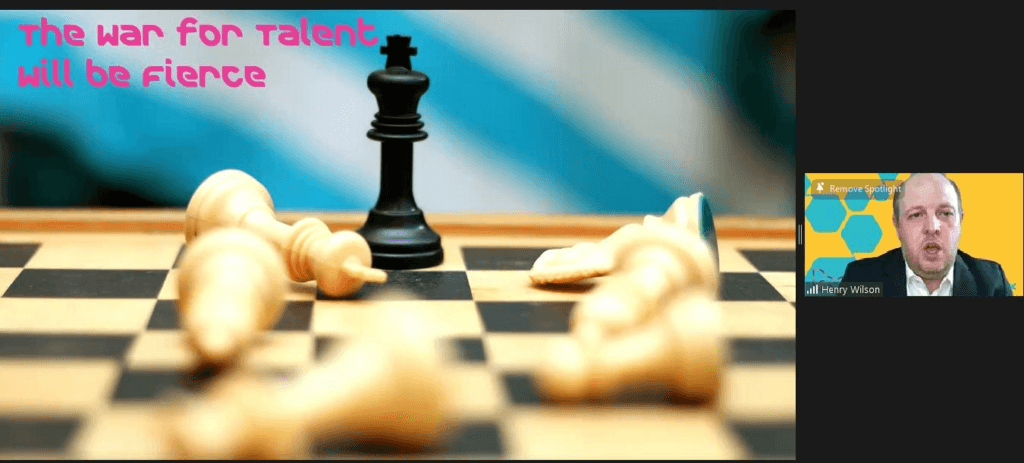
The war for talent will be fierce. Thinking about the value proposition for talents is going to be enormously impactful. Henry believes that talent attraction will be extremely pertinent. Why will the talent choose you? Think about their needs, hopes, and ambitions and put ourselves in their shoes in order to find out which strategies can be implemented to attract the talents we want for our organization. We will also have to prepare ourselves for new roles, those that we did not use to have in our organizations: data privacy, data analytics, etc.
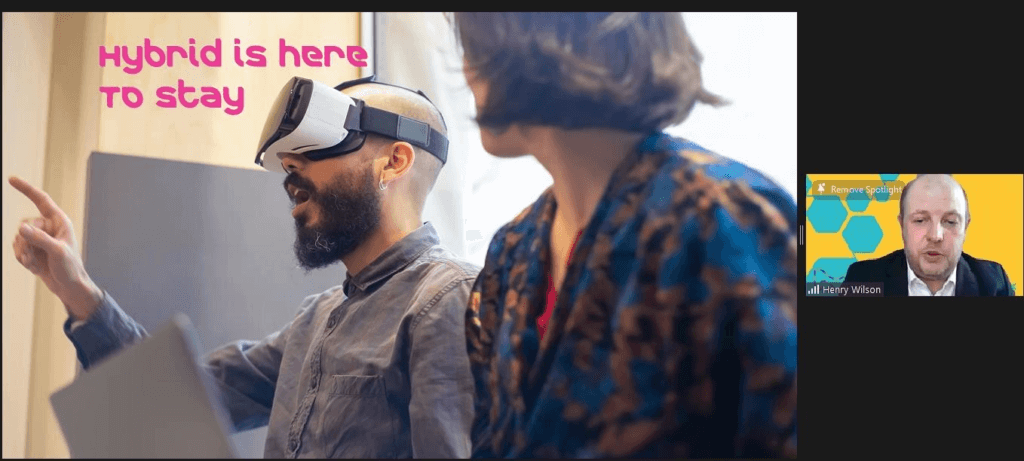
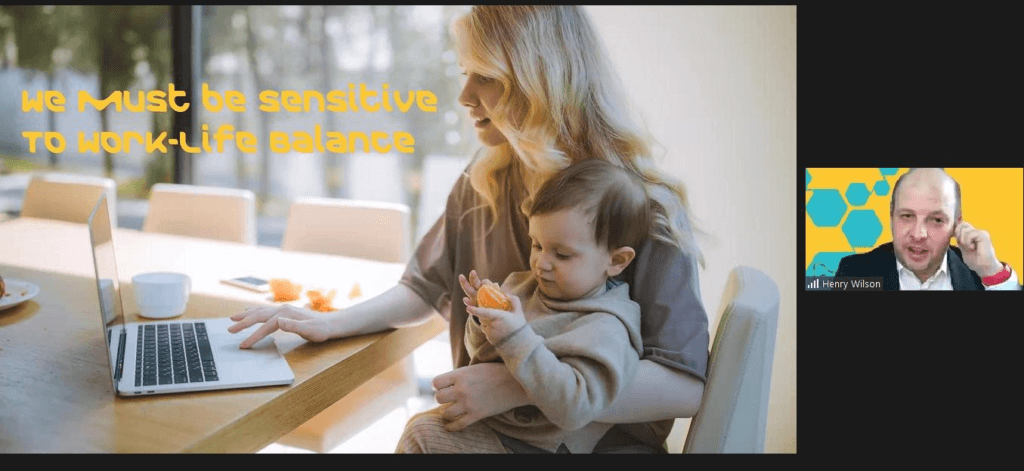
We must be sensitive to work-life balance. These are changing times and people will have to learn to adjust. The reality is we have to adapt and think through what work-life balance is really about for our colleagues and do something about it from the get-go. Hybrid work arrangements will be very helpful in attracting and retaining talents.
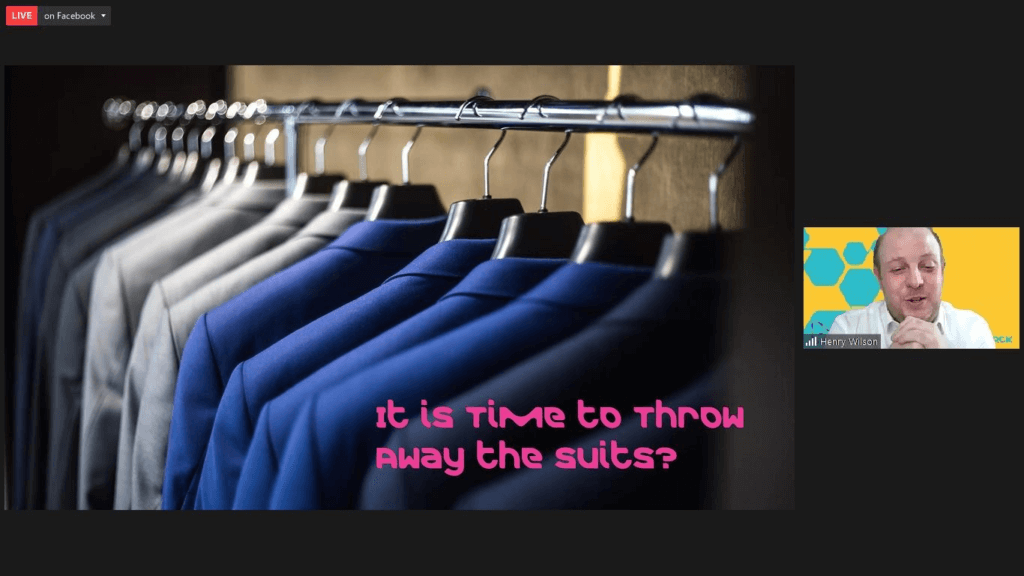
Is it time to throw away the suits? Henry agrees. People adjust to the changes we experience in life. At this point, and after what had just happened during the pandemic, employers and employees ask, “Is the quality of my work affected by what I wear?” Measure results.
Diversity, equity, and inclusion will continue to be important. There has been a great balance in numbers, especially in the Philippines. There has been a bigger participation from all sectors and everyone seems to be getting their fair opportunity. Henry emphasized that we should continue to drive these campaigns to reap more results of diversity, equity, and inclusion.
Old dogs will have to learn new tricks. It is time to adapt, train, and skill-build. Concepts like design thinking will become mainstream and innovation will play a significant part moving forward. Henry added that patient centricity will evolve; we expect to consistently innovate. How we used to treat patients will most probably change as we adapt to changes we experience every day.
Henry concluded by quoting Mark Twain, “It ain’t what you know that gets you into trouble. It’s what you know for sure that just ain’t so.” He urges us to challenge our assumptions and status quo and continue to look for ways to serve our purpose.
Please visit and join the John Clements Talent Community.

